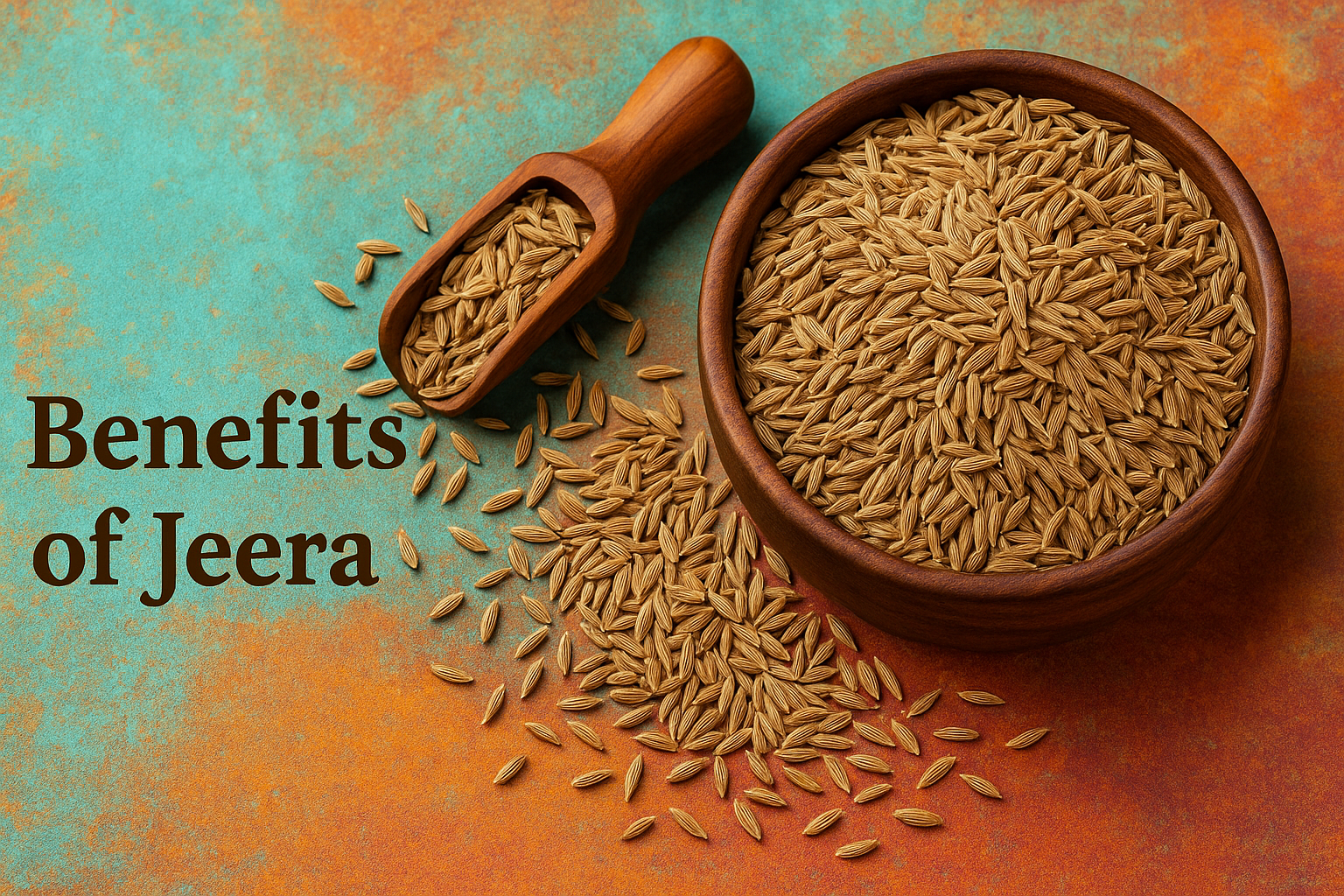Top 15 Amazing Benefits of Jeera (Cumin Seeds) 🌿
Jeera, also known as cumin seeds, is a popular spice used in almost every Indian household. But did you know that beyond flavor, jeera is packed with powerful health benefits? From improving digestion
Jeera, also known as cumin seeds, is a popular spice used in almost every Indian household. But did you know that beyond flavor, jeera is packed with powerful health benefits? From improving digestion

Jeera, also known as cumin seeds, is a popular spice used in almost every Indian household. But did you know that beyond flavor, jeera is packed with powerful health benefits? From improving digestion to boosting immunity and managing blood sugar levels, jeera is a natural wonder that deserves a place in your daily routine. Let's explore the incredible benefits of jeera and why you should consider consuming it more often. 🧘♀️🌱
One of the most well-known benefits of jeera is its ability to improve digestion. It helps stimulate the production of digestive enzymes, which leads to faster and more efficient digestion. Drinking jeera water early in the morning can also relieve bloating, gas, and constipation.
If you're trying to shed a few extra kilos, jeera might become your best friend. Jeera water, especially when taken on an empty stomach, can boost your metabolism and help burn fat faster. Combine it with a balanced diet and regular exercise for best results.
Jeera is loaded with antioxidants, which help fight free radicals and prevent oxidative stress. This means better skin, improved energy levels, and lower chances of chronic illnesses.
Jeera has anti-diabetic properties that may help regulate blood sugar levels. Studies have shown that cumin can improve insulin sensitivity, making it a great addition for people managing diabetes.
Thanks to its antioxidant and antibacterial properties, jeera helps in strengthening your immune system. It contains iron and other essential nutrients that support the body’s natural defense mechanism.
Having trouble sleeping? A small dose of jeera mixed with honey can work wonders. It has been known to calm the mind and promote restful sleep, thanks to its soothing effects on the body.
Jeera is rich in Vitamin E and anti-inflammatory compounds, which help in improving your skin health. It fights acne, soothes irritation, and gives your skin a natural glow. A jeera face mask or jeera-infused water can be a great addition to your skincare routine.
Jeera helps the liver flush out toxins from the body, making it an excellent natural detoxifier. Drinking warm jeera water daily can cleanse your system and leave you feeling refreshed and energetic.
Struggling with asthma or allergies? Jeera can help. It acts as an anti-congestive agent and helps clear mucus from the respiratory tract. The anti-inflammatory and antiseptic properties are beneficial for people with breathing issues.
Jeera is a rich source of iron, which is essential for the formation of hemoglobin. Including jeera in your diet can help prevent anemia and improve oxygen flow throughout the body, enhancing brain and muscle function.
Women suffering from menstrual irregularities or PCOS may find relief in jeera’s hormonal balancing properties. It also provides relief from period cramps and bloating.
Jeera is often recommended for breastfeeding mothers as it enhances milk production and provides essential nutrients. It also helps with post-delivery recovery and strengthens the immune system of both the mother and baby.
Jeera is believed to stimulate brain function, improve memory, and enhance concentration. The high content of iron ensures proper oxygen delivery to the brain, which is essential for cognitive function.
Thanks to its anti-inflammatory properties, jeera can help reduce pain and swelling in conditions like arthritis. Regular consumption may provide natural relief from joint and muscle pain.
Jeera helps in balancing the stomach’s pH levels and reducing the production of excess acid. A cup of jeera water after meals can prevent acidity and indigestion issues.
While jeera water is an excellent addition to a healthy lifestyle, there are other drinks that offer amazing health benefits too. Two of the most popular natural beverages include:
Green tea is loaded with antioxidants and nutrients that improve brain function, promote fat loss, and reduce the risk of heart disease. It complements jeera’s health benefits, especially for people focusing on weight loss and better metabolism.
Coconut water is nature’s energy drink. It is hydrating, rich in electrolytes, and great for your skin, heart, and kidneys. Pairing coconut water with jeera water in your routine can keep your body cool, refreshed, and detoxified.
Jeera is truly a super spice! 🌿 Whether you're looking to boost digestion, lose weight, enhance immunity, or improve your skin, jeera has got you covered. It’s cheap, easily available, and incredibly versatile. From water to tea and even in your cooking, there are multiple ways to make jeera a part of your healthy lifestyle.
Don’t forget to explore the benefits of green tea and benefits of coconut water for a well-rounded approach to natural wellness. 🌱✨
Start small, be consistent, and let nature heal you from the inside out. 💚
Writer and content creator
Log in to share your thoughts and engage with other readers.